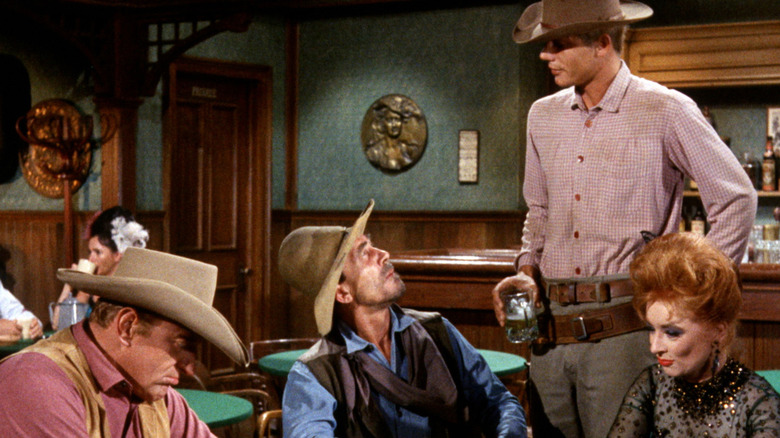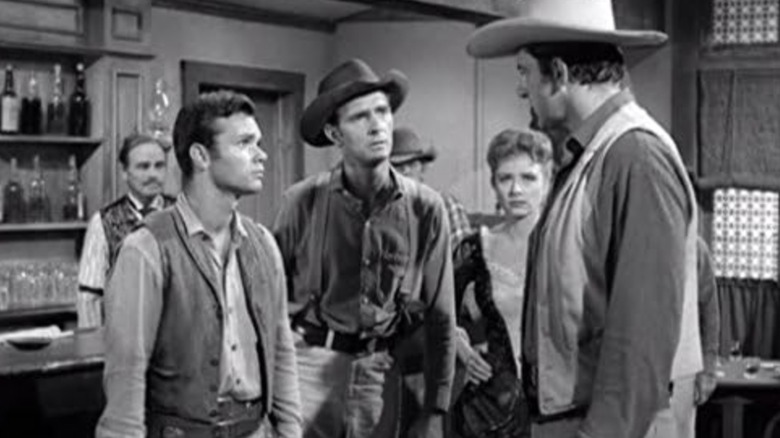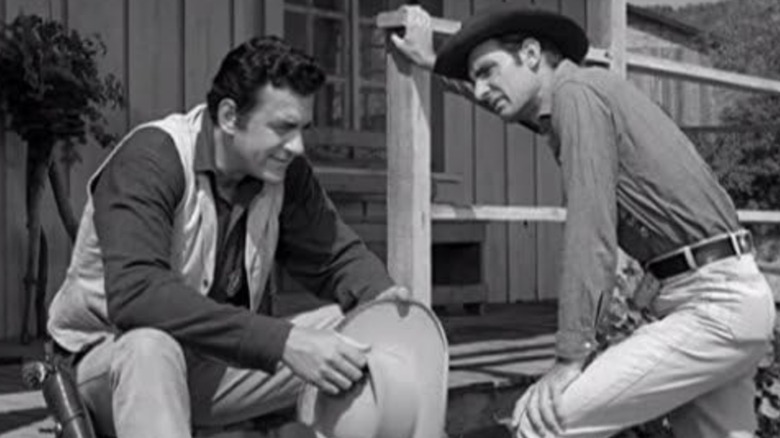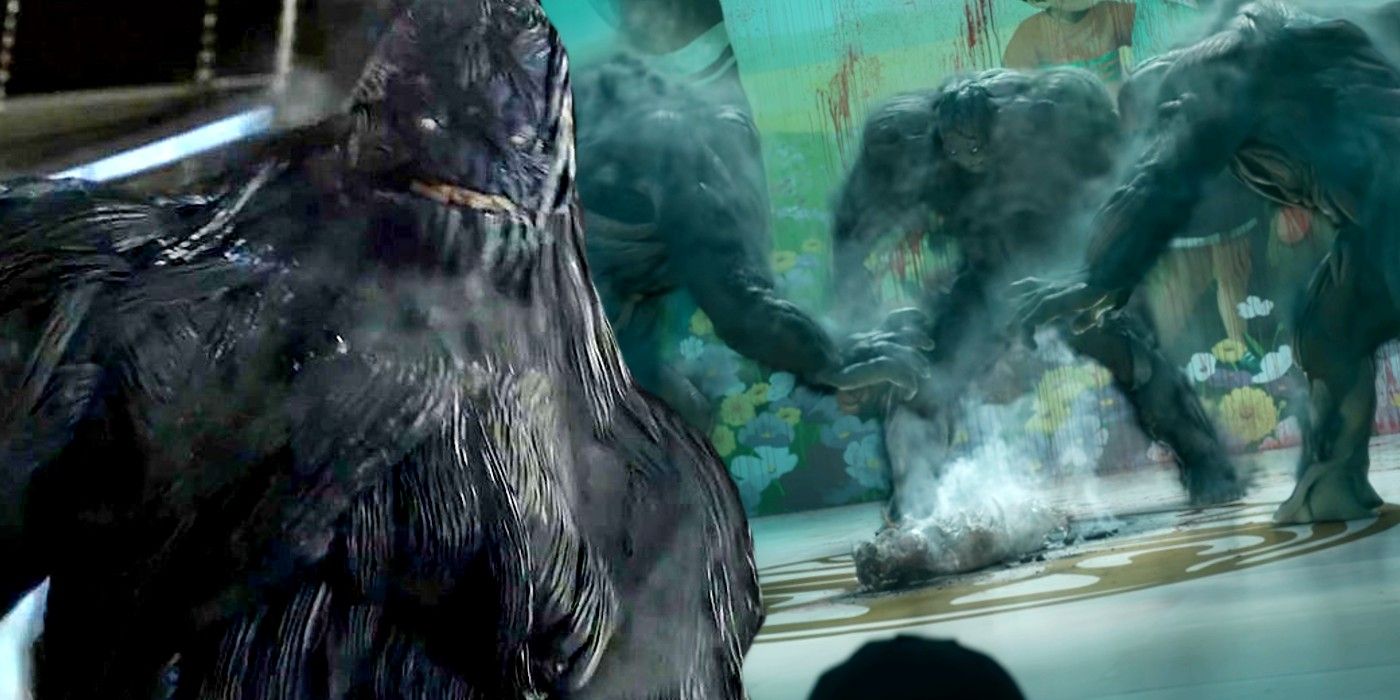We may receive a commission on purchases made from links.

CBS
For a generation of TV-watching Americans (or two), "Gunsmoke" was can't-miss programming. Adapted from an already wildly popular radio show of the same name, the 1955 TV series got in on the ground level of the newly ubiquitous medium and quickly became a household staple. A Western made at a time when the genre dominated the big and small screens alike, "Gunsmoke" starred James Arness as U.S. Marshal Matt Dillon, a duty-bound public official living in Dodge City, Kansas sometime after the Civil War.
"Gunsmoke" broke plenty of records in its time, thanks in large part to its impressive 20-season run on CBS. Couple that with the radio show that started three years before the TV drama, and for decades, Marshal Dillon and Dr. Galen Adams (Milburn Stone) were the fictional characters with the longest continuous run in an American TV-based franchise. Shows like "Law & Order: Special Victims Unit" and characters like Frasier Crane have since tied or broke those records, and medical drama "Grey's Anatomy" is also now entering its 21st season. Still, "Gunsmoke" is remembered for its crowd-pleasing and considerable run, and for the goodwill it seemed to maintain among the viewing public even as the TV landscape shifted dramatically from the '50s to the '70s.
Gunsmoke was part of the rural purge

CBS
So why did "Gunsmoke" end up canceled? According to several sources, including Marilyn J. Coleman and Lawrence H. Ganong's "The Social History of the American Family: An Encyclopedia," the end of "Gunsmoke" came at the tail end of what's been commonly referred to as the "rural purge." In the early days of television, an unusual number of shows centered on rural life, and together these programs created the halcyon but rose-tinted portrait of mid-century bliss that's often gestured to when people talk about "the good old days." The tumultuous 1960s modernized America in many ways, with the Civil Rights movement, 2nd wave feminist movement, a rise in political violence, and the Vietnam War each inspiring audiences with a hunger for a more modern TV landscape.
"Gunsmoke" in particular wasn't singled out for this reason (indeed, even though it was a fairly old-fashioned period drama, plenty of episodes did find ways to deal with modern issues), but generally changing ideals and interests among the viewing public — and at the executive level of the major networks — led to the eventual axing of several Western and rural-set shows. "The Social History of the American Family" cites "Green Acres," "Petticoat Junction," "Mayberry RFD," "Lassie," and "Beverly Hillbillies" as casualties of the rural purge, with "Gunsmoke" and "Bonanza," two of the longest-running of the bunch, lasting just a few years longer.
"The shows that replaced the rural shows were sitcoms that focused on socially relevant issues, either in their premise or over the course of their episodes," according to the encyclopedia. That meant shows like "All in the Family" and "M*A*S*H" would soon take over, launching TV into a more overtly politically transgressive space and replacing the dusty-but-beloved shows of decades past with vivid portraits of (slightly) more diverse American life. Unfortunately for the cast and crew of "Gunsmoke," the show's cancelation came as a total surprise. According to Arness' biography, even the show's writer and executive producer John Mantley wasn't clued into the news.
The show's cast and crew weren't told about its cancelation

CBS
"The end of 'Gunsmoke' came with a jolt!" Arness wrote. "Mantley was informed on 25 April 1975 that the network had decided to kill it. Of course, none of the people working on the show were informed of the cancellation." The actor, who passed away in 2011, wrote that the show's cast and crew found out about its abrupt ending by reading The Hollywood Reporter. According to that outlet's obituary for Arness, "Gunsmoke" was still in the top 30 most-watched shows on American television when it was pulled off the air, and Arness later told the Associated Press (via THR) that the cast had expected to make a few more seasons. "We didn't do a final, wrap-up show," he explained. "The [network] never told anybody they were thinking of canceling."
"Gunsmoke" was replaced by "The Mary Tyler Moore Show" spinoffs "Rhoda" and "Phyllis," and while Arness wrote that Mantley and other were "livid" about the sudden ending, he was happy with the records the show was able to set and the quality of the series. "It was probably the most watched television show in the history of the business, and it's still alive today," Arness wrote in 2001. Strangely, its final cancelation wasn't the most controversial in the show's history: it had also been canceled once in 1967 after declining ratings, a decision that caused an outcry that eventually reached Congress, and that led to the show's reinstatement and the subsequent ending of "Gilligan's Island."
The TV Western may have largely died out (with one massive exception), but "Gunsmoke" lived on in the form of constant reruns, several movies, and a still-strong reputation after all these years. In Arness' autobiography, he quoted LA Times columnist Cecil Smith, who once concluded: "The first moon colony we establish will be watching 'I love Lucy.' And probably 'Gunsmoke.'" Hey, it hasn't happened yet, but there's still time.




:quality(85):upscale()/2024/10/29/625/n/1922564/ec222ac66720ea653c5af3.84880814_.jpg)
:quality(85):upscale()/2021/07/06/971/n/1922153/7d765d9b60e4d6de38e888.19462749_.png)
:quality(85):upscale()/2024/10/29/957/n/1922441/c62aba6367215ab0493352.74567072_.jpg)

:quality(85):upscale()/2024/10/29/987/n/49351082/3e0e51c1672164bfe300c1.01385001_.jpg)
 English (US) ·
English (US) ·